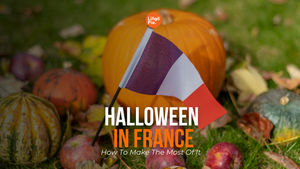Bienvenue, or "welcome", to this quick comprehensive guide to French phrases for everyday life and travel!
We will go over some basic French phrases and the essential French phrases for travel. If you want to learn to speak French, this is an excellent starting point for your foreign language learning journey.
Before we dive into this useful French vocabulary, we will also discuss various ways to learn French at home.
So, if you are planning a trip to France or another French-speaking country, kick-start your learning journey now with our top tips, concise vocab list and notes on French pronunciation.

Learning to Speak French
The process of learning French is made easier when you have the right learning tools in your tool kit. The more learning resources you use, the faster you will progress.
Remember to focus on all four language skills: reading, writing, listening and speaking. If you want to master the French language, all of these skills are essential.
You can sign up for free French courses online and use well-reputed language-learning apps like Lingopie or Duolingo, which you will find as iPhone and Android apps.
Different online courses and apps will focus on different foreign language skills, so try to use more than one in conjunction. On top of that, look for grammar and vocabulary-specific resources, such as YouTube videos, TikToks, Instagram reels and so on.
With the plethora of awesome free or low-cost learning resources at your disposal, learning French has never been easier or more fun!
Another great approach to learning French is to watch French movies and TV shows on Lingopie. This will develop your French language skills and understanding of French culture all while you are entertained.
French immersion in content created by and for native French speakers is invaluable. Download some French TV or music and learn French anytime, anywhere while you go about your everyday life.
You will be speaking French in no time if you use these learning tools for at least ten minutes every day. Remember - the more time you put into your learning, the faster you will progress!
Basic French Phrases
Now that you have read some top tips for learning to speak French quickly, let's break down some essential French phrases for everyday life and travel.
By learning just a few useful French phrases, you can build your confidence, introduce yourself and express your wants and needs in a new language.
So, here are the most useful French words and phrases to learn for beginners!
Bonjour
Bonjour means "hello" in French. Its literal translation is "good day" and you can use bonjour for "good morning" and "good afternoon" as well. Then, when the sun sets, you should switch to bonsoir, which means "good evening".
At night, you can say bonne nuit, which is "good night". If you want to politely greet someone and you are not sure which phrase to use, you can always opt for the simple but effective bonne journée, or "good day".
Comment vous appelez-vous?
If you are meeting someone for the first time in France, you can ask formally "what is your name?" by saying comment vous appelez-vous? or informally, using comment tu t'appelles?
Consider the person's social position in relation to your own and judge which version of the question is more appropriate. If they are your senior in a social or business situation, it is best to use formal language.
Je m’appelle…
Then, when asked your name, you can reply "my name is..." by saying either je m'appelle or simply je suis…
While the former means "I am called", the latter means "I am..." Both are acceptable ways to introduce yourself, so it comes down to personal preference.
At this point, you might add et je viens de… "and I'm from..." to your introduction.
Comment allez vous
Once you have introduced yourself in French, you might want to ask "how are you?" There is a formal way to do so; comment allez vous? as well as an informal option; comment ça va?
As you know, the choice of which phrase to use depends upon the formality of the situation and your relationship to the other person. You would ask your boyfriend comment ça va? but you would ask his mother comment allez vous?, for instance.
Ça va bien/ mal
The most common reply to the question "how are you?" in French is ça va bien, "I'm good"/ "it's going well". But you can also say ça va mal, "it's not going well", if that is a more accurate response.
Comme ci, comme ça
Everyone learning French in a classroom is familiar with this classic French phrase. If you are neither feeling good nor bad, you can say comme ci, comme ça, which means "so-so".
Oui/ non
Of course, oui means "yes", while non means "no". Once you start to ask and understand questions, these words will be vital for everyday use.
Au revoir
When it comes time to say goodbye, you can opt for the classic au revoir, meaning "goodbye".
À bientôt!
Or, you can say a more casual à bientôt!, which means "see you soon!"
S’il vous plaît
When asking for something in French, remember to add a s'il vous plaît or a s’il te plaît, meaning "please". Once again, the options here are formal and informal, so judge the situation and if in doubt, opt for the formal phrase.
Merci
Merci means "thank you". Please and thank you are two essential French phrases for everyday life and travel in the French-speaking world. When you visit any country in which French is the official language, you will do well to use your manners and show willing to be polite in French.
De rien
De rien means "it's nothing" or "you're welcome". French people respond to merci with this handy little phrase.
The French word rien means "nothing" or "anything" depending on the context. Think of the famous Édith Piaf song Non, Je ne Regrette Rien ("no, I don't regret anything").
Excusez moi
This useful French phrase means "excuse me". You can use excusez moi when you need to excuse yourself or get a person's attention to ask a question.
Qu’est-ce que…?
Finally, qu’est-ce que…? means "what?...", "what is it?" or "what is that?" depending on the context.
You can use this phrase to ask a longer question, such as qu’est-ce que tu fais ce soir?, meaning "what are you doing this evening?", for example.
Speaking French on Holiday as a Beginner
Parlez vous anglais?
If you want to ask a question you cannot yet express in French, you can always ask "do you speak English?"
Je parle un peu français
Then, you can explain "I speak a little French". This will encourage native French people to speak to you more clearly, using simple language.
Pourriez-vous parler plus lentement?
If you are still struggling to understand, you can ask "could you speak more slowly?"
Je ne comprends pas
And in the event that you cannot translate the other speaker's remarks, you can say "I don't understand".
French Travel Phrases
Où est …?
The question où est...? means "where is...?" and it can be followed by le, la, or les, depending on whether you intend to use a masculine noun, a feminine noun or a plural noun.
For instance, où est le guichet? means "where is the ticket window?", où est la banque? means "where is the bank?" and où sont les toilettes? means "where are the toilets?"
Je cherche
Je cherche means "I'm looking for". A common phrase uttered by tourists in Paris is je cherche la tour Eiffel, "I'm looking for the Eiffel Tower".
Je voudrais
Je voudrais means "I would like". This is an invaluable phrase when speaking French. Add a verb from your French dictionary and start to form a request. For instance, je voudrais acheter... "I would like to buy..."
Combien ça coûte?
The next logical question is, of course, "how much does it cost?"
La carte (des vins)
In a restaurant, you will want to know how to as for the "(wine) menu".
L'addition
And at the end of your meal, you can request "the check".
Santé
When you are clinking glasses with your French friends in the restaurant, you can say santé, which literally means "health". This is like when people who speak English say "good health" when they touch glasses.
À la vôtre
When your friends say santé, it is common to reply à la vôtre! "[and] to yours!" if you are with more than one person (or someone with whom you are speaking formally).
French Pronunciation
Finally, a note on the French accent. This is an area that many people find challenging when developing their speaking skills.
You will have to work on your pronunciation and French accent in order to improve your speaking skills, so try to shadow the speech of native speakers on French TV and listen to French songs.
As a beginner learning French, you might find the pronunciation illogical, but as you learn the basics, it will fall into place - we promise!
An example is the "est ce que” in qu'est-ce queue, which is pronounced like “ess que”. This is not instinctive to English language speakers, but it is consistent in French.
Now, let's look at some frequently asked questions about the French language!

FAQs related to learning basic French phrases
How can I learn French by myself?
You can learn French by yourself by using great online resources to inform your language learning. Language apps, online courses and streaming platforms are excellent tools to help you learn French grammar, vocabulary and language skills.
How long does it realistically take to learn French?
The timeline for learning French is different for everyone. Realistically, you can learn to speak French at a basic level in just a couple of weeks. Then, after 6 months to a year, you should be speaking French comfortably at an intermediate to advanced level.
Which words and phrases will help you a lot when traveling in France?
When traveling in France, there are certain words and phrases that will help you to sound authentic and communicate with native speakers. The French slang word picoler means "to drink alcohol [in excess]" and this is a great one for sounding like a local. You can also use c'est nul, meaning "that sucks", sans déconner, meaning "no joke" or vas-y mollo, "take it easy".
These colloquial French words and phrases will help you to fit in with native French speakers while you travel.
What are some sayings in French about travel?
Here are some useful French phrases about travel:
- Bonnes vacances! - have a good holiday!
- Bon voyage! - have a good trip!
- Les grandes vacances - school summer break
- Partir en vacances - to go on vacation
Summing Up: Mastering French for Your Next Travel
This guide to French travel phrases and French pronunciation is a great starting point for your French learning journey.
While you are learning French, try to use all of the available learning resources, such as TV and movies, music and apps.
The more you engage with native French content, the more your spoken French will develop a certain je ne sais quoi!
Sound like a native French speaker in no time with the help of Lingopie and other language-learning apps and websites.









